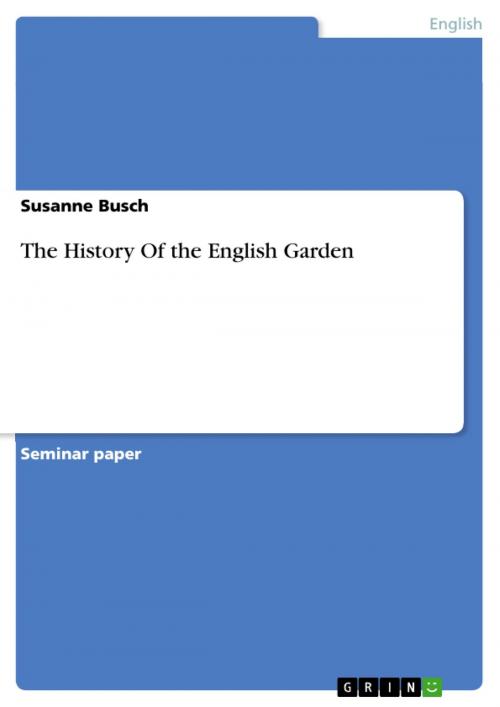The History Of the English Garden
Nonfiction, Reference & Language, Study Aids, ESL, Foreign Languages| Author: | Susanne Busch | ISBN: | 9783638531894 |
| Publisher: | GRIN Publishing | Publication: | August 8, 2006 |
| Imprint: | GRIN Publishing | Language: | English |
| Author: | Susanne Busch |
| ISBN: | 9783638531894 |
| Publisher: | GRIN Publishing |
| Publication: | August 8, 2006 |
| Imprint: | GRIN Publishing |
| Language: | English |
Seminar paper from the year 2001 in the subject English Language and Literature Studies - Culture and Applied Geography, grade: 2,0, Dresden Technical University, course: Englishness, 13 entries in the bibliography, language: English, abstract: In no other country in the world are more gardens open to the general public than in England. There is both a huge variety of styles and a big selection of plants. The list of international wellknown gardens is long. Gardens like Sissinghurst and Stourhead show the special character and greatness of the English Garden; however, each garden has its own flair and expresses the sometimes quite eccentric personality of the owner or creator. Besides, in England a person who renders gardening a great service gains honour and fame. For many gardening is more a prestigious rather than plainly a leisure activity. The art of the garden plays an important role in English society in general. The garden authority with the most influence is the 'Royal Horticultural Society', which has nearly 250,000 members. The garden festivals they arrange are popular social events. Moreover, the National Trust is a famous and very important institution concerning conservation work. The full name stands for the principles of this charity: 'The National Trust for Places of Historic Interest and Natural Beauty'. One aim of their work is to care for over 230 gardens in Great Britain. Apart from this, Britain has a very favourable climate. Frost-free zones for tropical plants as well as cold and windy weather can be found in only one county - e.g. in Cornwall. That makes it possible to get so different impressions of a landscape in a small part of the country and the climate meets the requirements for the 120,000 different species of plants growing in British gardens. The vividness of the English garden history in the present art of garden is remarkable. Many ideas were taken over from former garden styles like planting lavender, rosemary and ivy which were all brought to England by the Romans and can be find in all gardens today. Maybe the typical English garden like the continental people might see it is the English Landscaped Garden, which is the English contribution to the garden history.The recent head gardener of the Trelissick Gardens (National Trust), Barry Champion, may answer the question why the English people of all nations are famous for their love of gardens.He thinks that there is a difference in the art of gardening for example between the Germans and the English. [...]
Seminar paper from the year 2001 in the subject English Language and Literature Studies - Culture and Applied Geography, grade: 2,0, Dresden Technical University, course: Englishness, 13 entries in the bibliography, language: English, abstract: In no other country in the world are more gardens open to the general public than in England. There is both a huge variety of styles and a big selection of plants. The list of international wellknown gardens is long. Gardens like Sissinghurst and Stourhead show the special character and greatness of the English Garden; however, each garden has its own flair and expresses the sometimes quite eccentric personality of the owner or creator. Besides, in England a person who renders gardening a great service gains honour and fame. For many gardening is more a prestigious rather than plainly a leisure activity. The art of the garden plays an important role in English society in general. The garden authority with the most influence is the 'Royal Horticultural Society', which has nearly 250,000 members. The garden festivals they arrange are popular social events. Moreover, the National Trust is a famous and very important institution concerning conservation work. The full name stands for the principles of this charity: 'The National Trust for Places of Historic Interest and Natural Beauty'. One aim of their work is to care for over 230 gardens in Great Britain. Apart from this, Britain has a very favourable climate. Frost-free zones for tropical plants as well as cold and windy weather can be found in only one county - e.g. in Cornwall. That makes it possible to get so different impressions of a landscape in a small part of the country and the climate meets the requirements for the 120,000 different species of plants growing in British gardens. The vividness of the English garden history in the present art of garden is remarkable. Many ideas were taken over from former garden styles like planting lavender, rosemary and ivy which were all brought to England by the Romans and can be find in all gardens today. Maybe the typical English garden like the continental people might see it is the English Landscaped Garden, which is the English contribution to the garden history.The recent head gardener of the Trelissick Gardens (National Trust), Barry Champion, may answer the question why the English people of all nations are famous for their love of gardens.He thinks that there is a difference in the art of gardening for example between the Germans and the English. [...]















